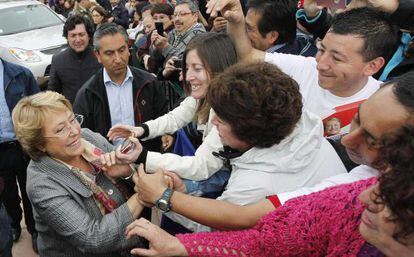Chilean election set to mark low for conservatives
Bachelet expected to win the presidency for the second time


Nearly 13 million Chileans are eligible to vote in the next presidential and parliamentary elections of November 17, a date that will clear up whether former Socialist President Michelle Bachelet can beat her eight rivals in the first round and lead the country once more.
Bachelet, 62, who served as president of Chile between 2006 and 2010, had settled down in New York to work as the head of UN Women, a post from which she resigned in March of this year to run for office again. A physician and military expert who served as defense minister under Ricardo Lagos, besides being a mother of three, Bachelet has a wide lead over her opponents in opinion polls. Results from late October show 47 percent support for her, which would grant Bachelet victory without the need for a second round of voting on December 15.
The political right, meanwhile, is grappling with a complex situation. Its candidate, former Labor Minister Evelyn Matthei, is running second with barely 14 percent of voters’ backing, according to the Center for Public Studies (CEP). This is significantly below the historical support rate for the conservatives, which typically hovers around 40 percent. A 60-year-old economist and also a mother of three, Matthei is running with the Independent Democratic Union (UDI), but she was selected only after Pablo Longueira, the candidate who had won the party primaries, bowed out of the race in July due to severe depression.
While the protests have died down, the anger remains: Chileans do not trust their democratic institutions
These will be the first elections to be held in Chile since the social unrest of 2011, when students protested on the streets and faced off with law enforcement agents. This was the spark that set off further demonstrations by the middle classes, who are upset at the inequalities and arbitrariness of the current economic system. While the protests have died down in recent months, the anger remains: Chileans do not trust their democratic institutions, and center-right President Sebastián Piñera continues to have low popularity rates.
The most recent Latinobarómetro opinion survey shows that Chileans are critical of Congress, the government, political parties and the judiciary, whose credibility index has been dropping since 2009. Given this political and social scenario, it is hard for analysts to predict turnout levels on November 17. This will also be the first presidential election under a new system of automatic voter registration and voluntary voting. In local elections held in October 2012, when the system first went into effect, nearly 60 percent of eligible voters decided to stay away. If abstention levels were to remain high, Bachelet’s chances of winning at the first time of asking would increase.
The former president is running on a platform of reform to education, taxes and the Constitution.










































